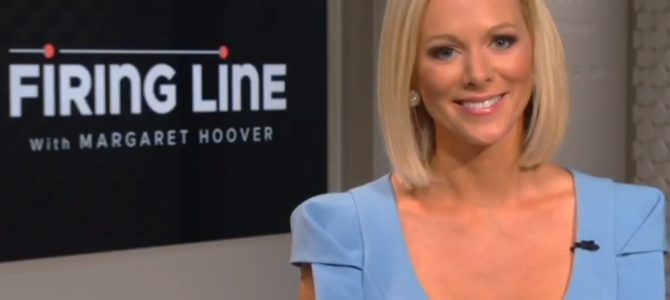
PBS recently attempted to revive the iconic “Firing Line with William F. Buckley Jr.” with CNN and sometimes FOX News contributor Margaret Hoover, who describes herself as a member of the center right. It might have been an opportunity to showcase intellectual conservatism in an era when an insufficiently populist disposition can easily end in being labeled an elitist and ignored.
After all, “Firing Line’s” original purpose was to put members of the Left under pressure and challenge their ideas quickly gaining traction in the culture. The show was, of course, aided in this mission by the fact that its host, William F. Buckley Jr., was one of the most brilliant and aggressive debaters of his time. However, without a deeply moralistic conservative host whose mission is a contest of ideas, the show loses a large part of what made it so appealing for the 33 years of its original run.
This is the greatest weakness of Hoover’s show. The revived program comes off less as a competition between fundamentally opposed visions for the world and more like every other long format sit-down interview show that a network like PBS might air.
A centrist as the host doesn’t work for what this show was intended to be. Rather than well thought-out, invigorated counters that drive both participants to sharpen their arguments, Hoover seldom offers pushback, even if the guest is mistaken about the unemployment rate or describes the Israeli response to terrorists as a “massacre.” Such a deliberate and tactful show was painfully missed in today’s media landscape and unfortunately continues to be so.
The Show Needs A Committed Conservative, Not a Centrist
To stay true to Buckley’s successful execution, the show needs a deeply philosophically conservative person sitting in the chair of the host. Hoover is not that person. Truly honoring the spirit of the show would require Hoover to aggressively stake out and defend a position from a perspective that isn’t conservative simply because the data suggests that, say, free markets benefit society, but from a perspective that is also rationalized morally.
It is one thing to argue that tax cuts are good because they encourage investment and business growth. It is another thing entirely to argue that tax cuts are good because it is morally wrong to needlessly deprive people of their earnings to fund government ventures into wealth redistribution. It is one thing to contend that tariffs are bad because they tax consumers and stifle innovation by protecting industries from competition. It is another thing entirely to argue that tariffs are bad because people have a God-given right to freely associate with whomever they please and ought not be encumbered by a government’s attempts to forcibly buttress an industry.
For a taste of Buckley’s depth and strength of both philosophy and rhetoric, see these episodes of the classic show. Below his guest is Norman Thomas, on the topic of going or staying in the Vietnam War.
Here Buckley interviews the writer Norman Mailer.
This show celebrating the show’s ten-year anniversary included guests Germaine Greer, Clare Boothe Luce, George S. McGovern, Morris K. Udall, Eudora Welty, Malcolm Muggeridge, and Fulton J. Sheen.
Now compare that to PBS’s reboot. The shortcomings of the show’s modern incarnation were staggering in the most recent episode. The guest was democratic socialist Alexandria Ocasio-Cortez, a candidate for a New York U.S. House district, whose optimistic rhetoric is lighter on substance and solid reasoning than any potential constituent should be comfortable with.
After all, this is a woman who advocates a federal jobs guarantee, socialized higher education, that taxpayers pay off all student debt, universal government-run health care, taxpayer-sponsored housing as a human right, banning politicians from taking campaign contributions from the “gun lobby or private equity companies that invest in the firearms industry,” and withdrawing U.S. troops from around the world.
With all of this, one would think the majority of the program would be spent challenging Ocasio-Cortez’s extremism, if not her platform’s numerous logical and practical flaws. Instead, the half-hour program gave Ocasio-Cortez a platform to spew vague rhetoric about the morality of democratic socialism and approaching collapse of our capitalist system.
Here, Give People an Ad for Socialism
The interview starts with Hoover asking Ocasio-Cortez to elaborate on what democratic socialism means to her. Predictably, she repeats the explanation she has given everywhere else: in a modern moral and wealthy society, no person in America should have to work really hard to support themselves or their family.
“We should aim for every person in this country to be covered by health care, to have access to a full college education, as well as trade school, and to make sure that people feel stable in their housing,” Ocasio-Cortez says. Hoover does not push back on this, even conceding that she shares similar goals.
The conversation takes an unfortunate turn when it moves to the Democratic Socialists of America. While detailing their increased membership over the past several years and asking Ocasio-Cortez what makes the group so appealing to young people like her, Hoover never questions the organization’s actual positions. Hoover sits, happily nodding her head, as Ocasio-Cortez touts socialism’s growing popularity.
Never does Hoover bring up that the economic crash Ocasio-Cortez cites as an explanation was caused by government housing policy, not the free market. Never does Hoover mention that the organization Ocasio-Cortez champions has members that openly fight for abolishing people’s ability to earn money for their labor. She also never directly addresses the logistical flaws of socialism.
Never Addressing Blatant Ignorance and Misinformation
When pressed about the fact that the economy is performing well with extremely low unemployment, Cortez responds that the low unemployment rate is a part of the problem because “unemployment is low because everyone has two jobs. Unemployment is low because people are working 60, 70, 80 hours a week and can barely afford to feed their kids.”
The unemployment rate is determined by the number of people who are not working but are actively seeking work. So a person working multiple jobs would not have any more effect on lowering the unemployment rate than would a person working only a single job. This should be common knowledge, especially for a public figure running a national news program.
It would not have taken much for Hoover to interject and point out that the number of jobs a person has or number of hours a person works has no effect whatsoever on the unemployment rate. But she didn’t. This is just the beginning of what quickly develops into a cycle: Ocasio-Cortez says something false or historically ignorant, like that the United States was not a capitalist country when it was founded. Hoover sits, nods, then moves on.
To her credit, Hoover retorts that capitalism has generated the most wealth and eliminated the most poverty of any other system, but undercuts her own efforts by allowing Cortez to explain away those facts as being a part of the natural evolution of economic systems. This is not true.
Nothing about human history guaranteed that free market capitalism would come to fruition. Its advent rests squarely on men like Adam Smith, who were informed by centuries of political and economic philosophy along with the Judeo-Christian culture they were born into. The rise of capitalism, like the Enlightenment and the Industrial Revolution, is not natural and could not be predicted by looking at human history. There is a reason similar economic success did not occur in other parts of the globe.
Things like the agricultural revolution, on the other hand, most certainly were a part of mankind’s natural evolution. People across the globe independently made similar progress and developed similar skills. The agricultural revolution was not contingent on any one person, culture, or environment, it was a byproduct of human nature.
If capitalism were just a part of the natural progression of economic systems, similar progress would have been made elsewhere in the world. Instead, capitalism only existed in the Western world and regions that the Western world introduced it to. This is another area where Hoover could have checked her guest. Instead, she allows Cortez to continue, talking about capitalism as if it deserves no credit because it was just a natural stepping stone on the path to her socialist utopia.
Hoover Checked One Significant Point, But Barely
Ocasio-Cortez backtracks on one topic due to pressure from Hoover: Israel. Ocasio-Cortez had taken to Twitter to call Israel’s efforts to repel terrorists sent to infiltrate their borders a “massacre.” She calls herself a supporter of the two-state solution then likens Israel’s response to protestors being killed in Ferguson, Missouri and victims of gun violence in New York.
Ocasio-Cortez goes on to say that “it would be completely unacceptable if that happened on our shores.” Hoover points out that the geopolitics of the situation make it unique, which Cortez concedes, but she never recants.
She continues: “at least in the occupation of Palestine, [there] is an increasing crisis of humanitarian conditions…” When Hoover asks what she meant by “occupation,” Ocasio-Cortez says she was referring to the settlements and “places where Palestinians are experiencing difficulty in access to their housing and homes.”
There are no settlements in Gaza. When Hoover again asks her to clarify, she stipulates that she is not the expert on the issue, and sees things through a “human rights lens.” Rather than pointing out that it is improper for anyone, particularly a candidate for high office, to spread misinformation, Hoover instead praises her honesty, even going so far as to say that she can learn once she gets to Washington.
This exchange is Hoover at her most bellicose, and even here she does not directly challenge anything Ocasio-Cortez says, instead opting to press for clarifications on an issue she clearly knows little about.
This Show Is a Major Missed Opportunity
From its inception, “Firing Line” was about showcasing an intellectual contest between opposing views of American life and politics. The show was so popular because it offered something on television that wasn’t found anywhere else: intelligent, well-reasoned conservative arguments presented against their left-wing counterparts.
Given today’s media spectacle, where conservative television consists of Sean Hannity and Laura Ingraham on one end dealing in anti-intellectualism for the sake of railing against the “elites” and Meghan McCain on the other doing battle against her progressive cohorts in the chaotic soundbite culture of most panel discussions, an astute and strident voice for conservatism on the national stage is sorely missed. Without that voice, “Firing Line” quickly devolves into just another long-form interview show.
If Hoover wants a weekly interview program, that’s fine, but if she wants to revive “Firing Line” for a new generation, she needs to be willing to directly confront the flawed arguments presented to her, rather than granting them legitimacy by sitting by while their orators drone on.









